 |
|
 |
2010
October
26-31
|
Taking a break
I'm taking a short break from blogging and will see you back here on November 1.
Permanent link to this entry


|
2010
October
23-25
|
Ramparts of Mare Orientale
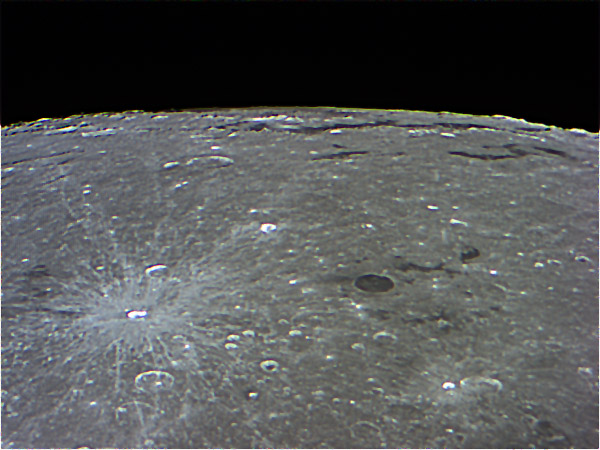
Here's another picture of the
concentric mountain
ranges around Mare Orientale,
and it really captures the feeling of flying over the lunar surface toward
the Mare, which is just over the horizon.
8-inch telescope, DFK camera, best 1500 of about 1800 frames of video,
multi-point aligned, stacked, and sharpened with RegiStax 5.
Permanent link to this entry
Jupiter
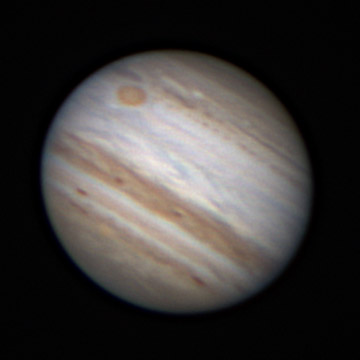
And here's Jupiter with the same setup, with a 3x Barlow lens added.
I'm getting good results fairly consistently now.
Permanent link to this entry
Miscellany
Here is a good
essay about when to junk a car.
The author points out that "never buy new" implies also "never sell used."
That is, don't trade in a used car. Buy a car a couple of years old and drive it until it is
literally beyond economic repair.
And when is that? Well, a car is only beyond economic repair if, at some particular moment,
the cost of keeping it going is more than it is worth. At that moment it has negative monetary
value, and giving it away (as junk) is profitable. But don't junk a car because several
separate repairs, at different times, have been expensive. That's the fallacy
of sunk costs.
I would add one more thing: What the car is "worth" is not its book value; it's what you would
spend to get a satisfactory replacement, taking into account that you know the history of your
own car and don't know the history of another car you might buy. So, with all this in mind,
it is rational to spend $1500 fixing a car with a book value of $2000 (as we have done more than
once).
Google scandal: Google's drive-by "street view" truck didn't just take pictures, it tried
to locate wireless networks, and recorded
data from unsecured networks, including passwords and e-mail.
Google's excuse is apparently that they didn't have time to extract the network IDs, so they recorded
everything for later processing. I don't buy that.
Anyhow, all wireless networks need a password or key of some sort. If a stranger with no
password can connect to your network, they will, and besides experiencing decreased performance,
you may find that they've chosen to spam or commit cybercrimes from your network so it will look
like you were doing it. You wouldn't leave your telephone outdoors for everyone to use.
Why do that with your wireless network?
By the way, there are several different kinds of network security, some better than others, but
right now, my feeling is that any kind of network security will do because you're competing
against networks that are totally unsecured. You don't need a strong lock if most of the other
people's doors have no locks at all.
[Revised.]
It's National
Breast Cancer Awareness Month.
I want to honor several friends who have bravely battled this disease.
(No names here. You know who you are.)
But, everyone, please note that pink by itself doesn't do the job.
All the pink ink in the world won't cure breast cancer.
If "awareness" means women get tested, everyone gets educated, and research gets funded,
then I'm all in favor of it.
But for some people, "awareness" may mean only awareness that there's a pink fad going on,
or a quasi-political statement that you're "against breast cancer" (who isn't?).
That doesn't particularly help.
I'm
not the only person who has started to express concern.
Let's not let "awareness"
degenerate into 1970s-style "consciousness-raising,"
which was derived from
the Transcendental Meditation doctrine that you can change the world
by just "raising consciousness." No — you can't change the world
unless people have accurate knowledge and act on it.
Permanent link to this entry


|
2010
October
21-22
|
Easter?
I'm not sure I completely understand
this news item.
I know that Western Christians (Protestant and Catholic)
don't celebrate Easter on the same day as Eastern Orthodox Christians.
And I know that Easter is supposed to be the Sunday on or after the
first full moon after the vernal equinox.
This is a Christian attempt to preserve part of the ancient Jewish
lunar calendar.
The vernal equinox is the moment at which the earth's equator and the
sun pass through the same plane. It occurs worldwide at a specific moment
every year, some time on March 21.
And the full moon occurs at a specific moment worldwide, when the moon is
as nearly diametrically opposite the sun as it gets.
The news item makes it sound as if the issue
is the calendar date of the equinox — which depends
on what time zone you're in.
But other sources tell me that the real issue is that neither the eastern
nor the western practice actually uses the date of the equinox at all.
Instead, the westerners use March 21 in the Gregorian calendar (which is
pretty close to the true equinox), and the easterners use March 21 in the older Julian
calendar, which has accumulated a couple of weeks of error by now.
Their position is that the Council of Nicea — which established the
Christian method of dating Easter — did not sanction any further changes
to the calendar.
Does anybody know more about this?
Permanent link to this entry


|
2010
October
19-20
|
Some interesting reading
Credit card fraud is apparently costing us
a
lot less than I thought.
There are classic data structures that
you can't implement in C#
because of the memory management.
I have a big article coming out in issue 24 of Make magazine, dated October 2010,
apparently going to hit the newsstands any day now.
Permanent link to this entry


|
2010
October
18
|
Farewell to Benoît Mandelbrot

You may have seen pictures like this one without realizing that they are actually
plots of mathematical functions, not artists' freehand fantasies.
The mathematician behind them,
Benoît Mandelbrot,
has died.
His work on fractals (ragged shapes) inaugurated what we might call the third stage
in the history of geometry.
Early geometry studied lines, circles, and certain well-understood curves such
as circles and other conic sections. This kind of geometry
started before Euclid and continues into modern high schools.
The second stage started with Descartes and studies smooth curves of all types.
This is basically analytic geometry and calculus.
But neither of these has much to say about ragged edges, irregular speckled patterns,
or the other irregular shapes
that we see all around us.
Enter Mandelbrot's fractal geometry,
the mathematical study of ragged shapes — which turn out to be abundant in mathematics too,
once you start looking for them.
In the 1980s, when computers with graphics suddenly became widely available, I was one of
many who spent a lot of time computing and displaying Mandelbrot sets.
I should probably honor Mandelbrot by creating a Mandelbrot set program in C#, but today
I'm too busy. Maybe soon.
Permanent link to this entry


|
2010
October
17
|
An infamous misleading error message
If you use any version of Red Hat, Fedora, or CentOS Linux, you've surely seen the error message:
Memory for crash kernel (0x0 to 0x0) notwithin permissible range
during boot-up. But then, after a pause, the computer starts up normally.
Never mind the typo in "notwithin" (for "not within").
The message seems to indicate something's wrong, and every Linux sysadmin has to do
what I did — look it up.
Here's what I found. The message means there is no memory allocated for a crash diagnosis utility,
and at that early stage, Linux doesn't know that you actually don't want to run that utility anyhow.
So it reports a problem, seemingly a serious one.
For several years
members of
the Linux community have been asking
for it to be changed.
The special pair of addresses "0x0 to 0x0" — meaning no memory at all — shouldn't trigger
a "not within permissible range" message. Instead, the message should say something like this:
Crash kernel is disabled or not configured (no memory allocated)
and it wouldn't alarm or mislead us. When will the maintainers of the Red Hat kernel actually
make the change?
Permanent link to this entry


|
2010
October
16
|
Short notes on unhealthy matters
Anti-cannabis note #1:
If California (or any other state) legalizes marijuana, the problem is that
the illegal drug
industry will still be there, and will be mad.
Legalization doesn't make criminals disappear.
It threatens their livelihood, and they fight back.
There were whiskey bootleggers for 40 years after the end of Prohibition, and
they were a nasty bunch.
Anti-cannabis note #2:
I don't think "medical marijuana" (legal in Colorado) is medicine.
The work of making cannabis into a medicine has not yet been done
(or if it has, it has been ignored).
The cannabis plant itself
is very
variable and unpredictable
and contains multiple drugs, including, apparently, two that counteract each other.
I wouldn't use anything medicinally that is such a mess.
I think "medical marijuana" is just a cover for recreational drug use.
UGA to go smoke-free?
In a non-binding referendum, University of Georgia students
(or at least, the 12% or so that chose to vote)
voted by a 2/3 majority to make the whole campus smoke-free like Emory's.
People are getting tired of "running the gauntlet" through a crowd of smokers
at the entrance to every building.
Of course, this is a relatively small sample of the student body,
and I don't know what will happen next.
But the fact is, almost all college campuses in Georgia are
already totally smoke-free (indoors and out).
This is very different from 1973, when I came here — at the time, smoking in
classrooms had just been banned, and people were still grumbling.
Around 1980 I dropped a course at Yale because I couldn't stand the professor's
cigarette smoke.
Permanent link to this entry


|
2010
October
15
|
Hump day
I think October 15 is the busiest day of the whole academic year.
The new students have gone through the "culture shock," first
underestimating and then overestimating their workloads, and are
settling into a routine. This is the point at which people stop
scheduling more activities for the semester, and we spend the next
few weeks finishing what we've started.
Permanent link to this entry


|
2010
October
14
|
Putting Windows at the top of the Ubuntu boot menu
(and making it stay there)
Want a nice, fast, free operating system for your PC?
Try Ubuntu Linux.
It can easily install itself to dual-boot with Windows.
And thereby hangs a tale.
By default, Ubuntu Linux puts itself first in the boot menu;
then there are a couple of recovery and test modes, and
Windows comes last. When Linux updates itself, the new Linux
kernels are added at the top, ahead of the old ones, which stay
there just in case...
What if you usually boot Windows and want it to be the top item
in the list? (Not just the default, but the top item.)
With earlier versions, all you had to do was edit /boot/grub/menu.lst
and put Windows ahead of the automatically generated entries.
Not any more. Instead of /boot/grub/menu.lst the menu resides
on /boot/grub/grub.cfg, which is automatically generated.
Details here.
It gets regenerated when there's a major Linux update.
So although you can edit grub.cfg (and I have been known
to do so), it will revert to its original state whenever a sufficiently
powerful update happens. Not good.
So let me present a simple hack that will put Windows first in the menu,
always. What you're going to do is rename one of the scripts that
regenerate grub.cfg.
To be precise, grub.cfg is generated by a series of scripts that
reside in /etc/grub.d and run in alphanumerical order.
So all you have to do is rename 30_os-prober (the script that
finds the non-Linux operating systems) to become 09_os-prober so
it will run ahead of the other scripts that generate menu entries.
The commands to do that are:
cd /etc/grub.d
sudo mv 30_os-prober 09_os-prober
sudo update-grub
And that's it. Don't be alarmed if Windows has a funny name, such as
"Windows Recovery Environment." You can fix that (temporarily at least)
by editing grub.cfg, knowing it will eventually revert to its old value.
Permanent link to this entry


|
2010
October
13
|
Jupiter

This may be my best Jupiter picture yet. It was taken on the evening
of October 10 from my driveway. It's a stack of the best 1500 frames
from an 1800-frame video (about four minutes at 7.5 fps), taken with a DFK
camera, 8-inch Meade LX200 telescope, and 3x Barlow lens. Note the Great
Red Spot at the upper left edge.
Permanent link to this entry


|
2010
October
12
|
Canon A3000IS pocket-size camera

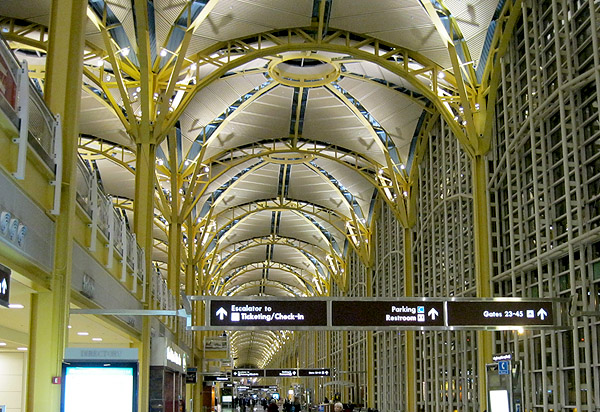
$150 buys a lot of camera these days. For the trip, I needed something smaller
than a DSLR, and our earlier Canon PowerShot has been given to Cathy, so Melody and I
bought ourselves a Canon A3000IS. We're pleased with it.
Pro:
- Very intelligent automation. In AUTO mode it does a good job of deciding for itself
whether to fire the flash and what other settings to make.
- Face recognition works well; it chooses areas of interest (usually faces) and focuses
on them.
- Good image stabilization and good macro mode. Above you're looking at the architecture
of Reagan Airport at night (1/20 second handheld) and a macro shot that looks a 3-inch-long
lizard in the eye.
- Lots of user settings available in P mode.
Con:
- We ended up turning face recognition off. Many of our pictures don't have a face in
them, and in that situation the camera does not always choose its focus area wisely.
Since we are accustomed to conventional autofocus cameras, I set this one to always focus
in the center.
- Like most compact-camera lenses, this one has considerable barrel distortion when
not zoomed near maximum optical focal length. Always zoom before taking a picture,
unless you actually need extreme wide-angle coverage. But I understand why extreme-wide-angle
is the default: inexperienced snapshooters notoriously don't aim their cameras, they
just point them vaugely in the direction of the subject.
- On the display, the midtones look too light and it is easy to think a picture is
overexposed when it isn't.
- The full instruction manual is supplied only on disk and on the Internet, not on paper.
Inflation-adjusted, this is the cheapest camera I've ever bought that is capable of
serious work. Its price of $150 or less today is equivalent to $25 in 1970 dollars.
Permanent link to this entry
Miscellany
OK, Microsoft and Adobe, I'm getting tired of this: Every time I turn on a Windows computer that
hasn't been used in a couple of days, Big Brother wants to spend an hour updating it.
Often there are two Big Brothers, Microsoft and Adobe; sometimes Sun Java also wants
to join in the fray.
We're moving toward a world in which 100% of our computer time will be spent on software updates.
Why not build it right in the first place?
What teachers knew, or at least feared:
Lots of native speakers
of English can't understand simple sentences in their own language,
such as telling the difference between
"The sailor was hit by the soldier" and "The soldier was hit by the sailor."
We really do learn English in school, not just at our mother's knee.
(But one thing bothers me about this one. Maybe it's simply word choice. Would they have
understood got hit in place of was hit? If so, you've found a dialect in which
passive verbs are marked by got, and nothing more sinister is going on.)
Permanent link to this entry


|
2010
October
11
|
National Law Enforcement Officers Memorial
Charles G. Covington, 1923-1966
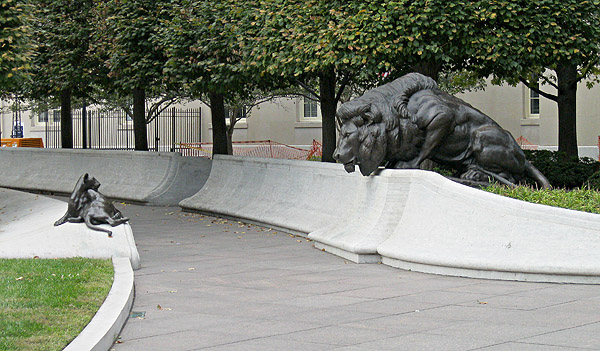
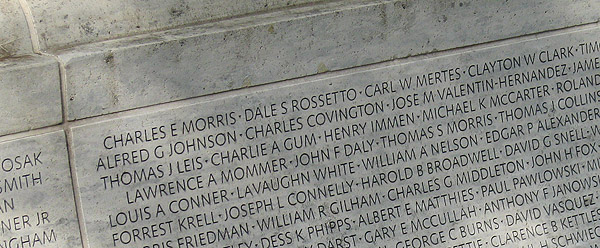
On October 9, 1966, my father was killed in the line of duty as a federal
law enforcement agent in Valdosta. Forty-four years later, this October 9,
I happened to be in Washington, D.C. (more about the trip later), and I found
his name on the
National Law Enforcement Officers Memorial
above the Judiciary Square Metro station.
The memorial is an ellipse, open at the ends, comprising dozens of engraved stone panels.
At each end of each side, there is a sculpture of adult lions guarding their cubs.
As you can see in the picture, one panel had been removed, presumably to add names.
Others were being worked on in place.
Permanent link to this entry


|
2010
October
6-10
|
Very short notes
I have a lot of work coming up and will reappear here on the weekend.
In the meantime, learn something about electronics here.
Or access a UNIX computer with PuTTY, here.
Permanent link to this entry


|
2010
October
5
|
Short notes
Happy birthday, Melody!
Interesting new economics book:
Greg Mankiw and a co-author have written a textbook about macroeconomics
and the financial system. Details here.
Note that the lead author is a policial and social conservative,
is very eminent (teaches Harvard's most popular course), and
this was written after the Panic of 2008 and analyzes what happened.
The book will come out in December or January. I'm looking forward to reading it.
Weird gadget of 1947:
Somebody built a
mechanical word processor
that allowed you to view and edit a line before printing it.
Details are sketchy, but I'm guessing it worked like an adding machine, with maybe 60 or 70
wheels each with the whole character set on it, each of which spins into position so you can
view it before choosing to print.
Some computer museum somewhere needs to find one of these and put it on display!
Permanent link to this entry


|
2010
October
4
|
And it works...
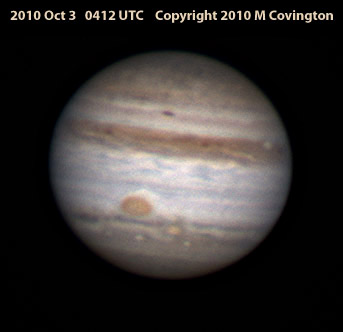
The Crayford focuser helped me focus this image of Jupiter.
8-inch telescope, DFK camera.
Permanent link to this entry


|
2010
October
1-3
|
New gadget
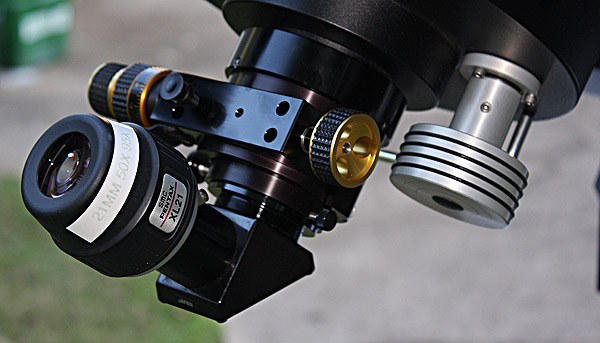
Things aren't dull here — I'm too busy to write a proper blog — but here's
one bit of news. I've added a
JMI EV-1c Crayford focuser
to my classic Meade LX200 telescope.
Now I have three focus knobs: coarse (the original big round knob, itself an upgrade
from what Meade supplied); medium (two larger gold knobs); and fine (the smallest gold knob
on the left). Crucially, the medium and fine knobs do not move the main mirror, so there
is no irregular or sideways image motion. How did I ever focus this telescope without it?
This focuser is versatile. It takes 2-inch eyepieces, 1 1/4-inch eyepieces, anything
with T-threads (i.e., camera adapters), and anything with the same threads as those on the
back of the telescope. The configuration you see is not quite the final one; I'm going to
have a 2-inch diagonal. (The T-threads are optional; the standard configuration lacks them,
but they were out of one of the standard parts, so they gave me a good deal on the optional one.)
Alert eyes may detect that the gadget is mounted upside down so it won't bump into the
pre-existing focuser knob. That is, of course, not really a problem.
Permanent link to this entry
Inflammatory things I've said on Facebook lately
Think, and form your own opinions...
(1) "If public colleges and universities worked like public grade schools, you would be assigned to a college near your home; you could not go anywhere else or major in anything not offered there; and people would accuse you of being a snob if you spent money to go to a private college.
As it is, public and private colleges compete freely and are on friendly terms with each other. What can we learn from this?"
(2) "Please note that the moral issue surrounding the Rutgers suicide is not homosexuality or whether the activity in the dorm room was permitted by dorm rules (it may well not have been). Someone was secretly videotaped in a very compromising situation and the video was published, driving him to kill himself. That is not a 'prank.' That is either serious malice or astonishing inability to distinguish right from wrong."
Permanent link to this entry


|
|
|
This is a private web page,
not hosted or sponsored by the University of Georgia.
Copyright 2010 Michael A. Covington.
Caching by search engines is permitted.
To go to the latest entry every day, bookmark
http://www.covingtoninnovations.com/michael/blog/Default.asp
and if you get the previous month, tell your browser to refresh.
Entries are most often uploaded around 0000 UT on the date given, which is the previous
evening in the United States. When I'm busy, entries are generally shorter and are
uploaded as much as a whole day in advance.
Minor corrections are often uploaded the following day. If you see a minor error,
please look again a day later to see if it has been corrected.
In compliance with U.S. FTC guidelines,
I am glad to point out that unless explicitly
indicated, I do not receive payments, free merchandise, or other remuneration
for reviewing or mentioning products on this web site.
I have a Canon EOS 20Da camera and a Tektronix
TDS 210A oscilloscope on long-term loan from their manufacturers. Other reviewed
products are usually things I purchased for my own use, or occasionally items
lent to me briefly by manufacturers and described as such.
|
|













